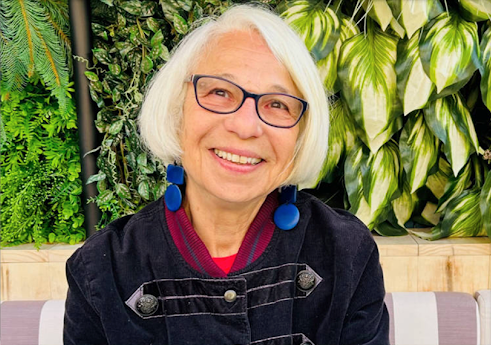
Lenore Weiss serves as the Associate Creative Nonfiction (CNF) Editor for the Mud Season Review and lives in Oakland, California. Her environmental novel Pulp into Paper was published last year on Earth Day as was a new poetry collection, Video Game Pointers from WordTech Communications.
What inspired you to write your environmental novel, Pulp into Paper?
(LW): I lived in the Louisiana and Arkansas area for several years. When I stepped outside my house in the morning, I detected a strange smell, almost like a convention of cigar-smokers. This was my introduction to paper mills.
Through what was then called, the Louisiana Environmental Action Project, I got to know people living in Crossett, Arkansas. Retirees were organizing to pressure the EPA (Environmental Protection Agency) to investigate high levels of cancer and asthma in both adults and children. Georgia Pacific (Koch Brothers) were dumping the mill’s effluents in people’s backyards, primarily in the black community. People couldn’t eat anything they grew. No tomatoes. The groundwater was polluted. Areas of Crossett were like a toxic dump. While more modern mills employ technologies to recycle the chemicals produced in the pulping process, this particular mill was old. The company did not want to invest in making it a safer place for the workers and people who lived in the area.
My novel, Pulp into Paper, grew out of that experience.
How did your journey into poetry begin?
(LW): My mother loved poetry and recited poems to us as kids by Henry Wadsworth Longfellow. I loved the rhythm and sound of those words. As I grew older, I read more poetry. I loved The Odyssey by Homer, and Shakespeare’s plays. Of course, I didn’t understand all the words, but his metaphors were like puzzles. I studied 17th and 18th century English poetry from anthologies in our school library: John Donne, and later, William Blake, Gerard Manley Hopkins, and others. I loved poetry and often visited the Gotham Book Mart (now defunct) located in New York City’s jewelry district where I could smell all the old books stacked up to the ceiling and on top of each other. Poetry was like a romance with an attractive lover and I wanted more.
In your biography, your trilogy of poetry focuses on the feelings of love, loss, and being mortal. Why do you think that you gravitated toward those emotions in your work?
(LW): Most of human life is shaped by the emotions of love, loss, and being mortal. In my case, I was frequently sick as a young person. In my early twenties, both my parents died. Poetry helped me navigate through those difficult times. In my twenties, the Black Liberation Movement was emerging, new independent poetry presses like Broadside emerged to publish the work of Sonia Sanchez; Third World Press published Don L. Lee (now Haki R. Madhubuti). Margaret Walker published her poem, “For My People.” I understood how poetry allowed writers to speak from a deep place of longing for freedom and liberation. It took writing three books of poetry to see those interconnections in my own work—how I was grieving my losses and wishing to free myself.
How do you choose which topics to write about?
(LW): I think topics choose me. I have to care about something. I keep notebooks with quotes and phrases from my reading, combinations of words that are interesting. I listen to people’s conversations and write descriptions of individuals who I see on the street. These things converge and emerge in my writing.
Do you have a favorite project you’ve done before?
(LW): When I worked as a technical writer, I authored a blog called, “Tech Table Talk: It’s Not Over Your Head.” Outside of writing tedious manuals and deciphering the notes of software engineers, I wanted to challenge myself and make my job more interesting. I had the idea to create a blog aimed at explaining technology. This was at the beginning of what is now called the “Computer Revolution.” A lot of my friends who worked outside of technology felt intimidated by computers, similar to the discussion we are having today about AI– is it good or bad? Many people were suspicious. I decided to focus my blog on new and positive environmental technologies that I found interesting like capturing methane gas produced by cows and converting it into electricity. I reported on new software for desk top publishing that was being created by companies like Adobe. I felt I was providing a service, and at the same time, educating myself.
And lastly, who are your writing inspirations and why?
(LW): I find inspiration from writers who love humanity—the writers who come to mind are Luis Alberto Urrea, Carolyn Forché, Joy Harjo—writers who are technically and otherwise brilliant like Virginia Woolf and Ursula K. Le Guin, or who care deeply for the environment like Terry Tempest Williams. I also draw inspiration from visual artists like Ruth Asawa who worked continually with new forms and explored the potential contained in each one.
Lenore’s poetry collections form a trilogy about love, loss, and being mortal: Cutting Down the Last Tree on Easter Island (West End Press, 2012); Two Places (Kelsay Books, 2014), and The Golem (Hakodesh Word Press, 2017). Her most recent poetry chapbook is From Malls to Museums (Ethelzine, 2020). Alexandria Quarterly Press published her prize-winning flash fiction chapbook, Holding on to the Fringes of Love.

Leave a Reply